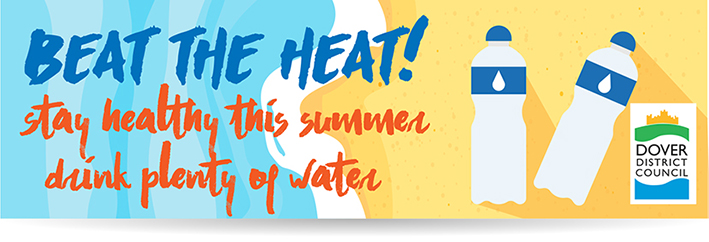Beat the Heat

Staying safe in the hot weather
While many of us enjoy the hot weather and like to have fun in the sun, it is vital to remember the importance of staying safe. High temperatures can be harmful to your health and, although the heat can affect anyone, some people run a greater risk of serious harm.
Common health risks caused by hot weather include dehydration, heat exhaustion, heat stroke and sunburn.
We are therefore urging residents to practice sun sense and look out for others, especially those vulnerable such as the elderly, young children and those with serious illnesses.
Top tips for being sun safe
- Try to stay out of the sun, especially between 11am to 3pm
- If you have to go out in the heat, wear UV sunglasses, walk in the shade and use a sunscreen (containing at least SPF 15) and reapply regularly. Wear a hat and light, loose-fitting cotton clothes
- Avoid extreme physical exertion. If you can’t avoid strenuous outdoor activity, keep it for cooler parts of the day - for example, early morning or evening
- Drink plenty of cold drinks, such as water and diluted fruit juice, and cut back on alcohol, caffeine or drinks high in sugar. When travelling ensure you take water with you
- Eat cold foods, particularly salads and fruit with a high water content
- The young, older people & ill are most at risk: keep an eye on friends, family and neighbours. Get help if needed
- Don’t leave babies, children, older people or ill people or pets alone in stationary cars
- Shade or cover windows exposed to direct sunlight and keep windows that are exposed to the sun closed during the day. You can open the windows for ventilation when it is cooler.
- Turn off non-essential lights and electrical equipment – they generate heat
- Keep indoor plants and bowls of water in the house - evaporation helps cool the air
- If temperatures are less than 35°C consider using an electric fan as a way to get some relief
- Have cool baths or showers, and splash yourself with cool water.
- If you or others feel unwell, get dizzy, weak, anxious or have intense thirst move to a cool place, rehydrate and cool your body down; get help if needed
- Rest immediately in a cool place if you have painful muscular spasms and drink cool drinks or rehydration solutions; get help if needed
- Listen to alerts on the radio, TV and social media about keeping cool
- Plan ahead to make sure you have enough supplies, such as food, water and any medications you need
How do I know if someone needs help?
Seek help from a GP or contact NHS 111 if someone is feeling unwell and shows symptoms of:
- breathlessness
- chest pain
- confusion
- intense thirst
- weakness
- dizziness
- cramps which get worse or don't go away
Get the person somewhere cool to rest. Give them plenty of fluids to drink. Find out about the symptoms of heat exhaustion and heat stroke.
More information
- The UK Health Security Agency has published hot weather and health: guidance and advice to help minimise the risk of extreme heat on health. This includes supporting vulnerable people and events and mass gatherings.
- NHS Live Well has more information about seasonal health including sunscreen and sun safety, getting vitamin D from sunlight and how to cope in hot weather.
- UK Health Security Agency blog Staying safe in extreme heat discusses how important it is that we all take sensible precautions to avoid becoming unwell and to enjoy the hot weather safely.
- The UK Health Security Agency, in partnership with the Met Office Heat-Health Alert Service Watch from June to September - sign up for alerts.
- Check the weather forecast withe the Met Office.
- Kent County Council's Keeping cool in hot weather pages provide further guidance and advice.
Working Temperature
The Health and Safety Executive's Temperature webpages explain the concept of thermal comfort, and contains specific advice on heat stress, dehydration and cold stress when working at very high or low temperatures.
Don't forget your pets
Please see the RSPCA website for information on how to keep your pets cool in hot weather.
Guidance for those travelling abroad
The UK Health Security Agency has published a series of materials for people travelling overseas. The materials give information for those travelling to visit friends and family abroad and emphasise that English residents do not have the same protection against infections as local residents of the overseas country, even if they have frequently visited or lived in the country.
This travelling abroad to visit friends and relatives leaflet gives information to travellers. It encourages them to see a healthcare professional before travelling for personalised information on the country's risks and what vaccines or medications they possibly need.
The UK Health Security Agency has also published a series of materials on mosquito bite avoidance. These materials give information for those travelling, showing the risks of getting bitten by a mosquito abroad and the diseases that could come with it. They also show how to avoid getting bitten and what to do if you feel unwell while abroad.
Drought - public health advice
The UK Health Security Agency has published information on the potential health impacts of drought in England and the measures people can take to stay healthy during periods of drought.